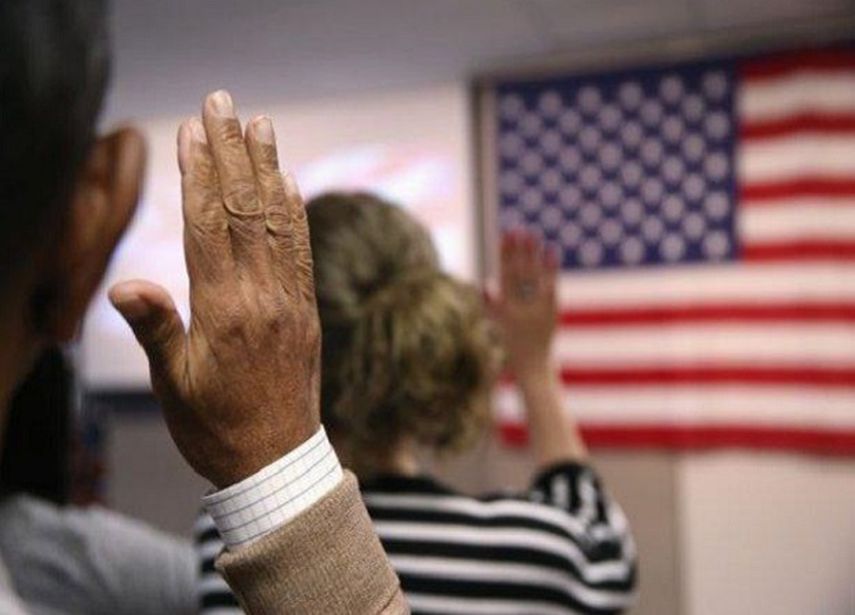The so-called naturalization test is one of the final steps in obtaining US citizenship: a months-long process that requires years of lawful permanent residence before applying.
Many are still in shock after the administration of then-Republican President Donald Trump changed the test in 2020, making it longer and harder to pass. Within months of taking office, Democratic President Joe Biden signed an executive order aimed at removing barriers to citizenship. In that spirit, the citizenship test returned to its previous version, last updated in 2008.
US authorities announced in December that the test would have to be updated after 15 years. The new version is expected to be released by the end of next year.
United States Citizenship and Immigration Services (USCIS) propose that the new test add an oral section to assess speaking and listening skills in English. The examiner might display photos of common situations—such as everyday activities, weather, or food—to ask the applicant to verbally describe the photos.
In the actual test, an official assesses the ability to speak English during the interview, asking personal questions that the applicant has already answered on the naturalization process paperwork.
“For me, I think it would be more difficult to look at pictures and explain them,” explains Heaven Mehreta, who immigrated from Ethiopia 10 years ago, passed the naturalization test in May and received US citizenship in Minnesota in June.
Mehreta, 32, says she learned English as an adult after moving to the United States, and found pronunciation very difficult. She worries that adding a new photo-based oral section, instead of personal questions, will make the test more difficult for others like her.
Shai Avny, who immigrated from Israel five years ago and became a US citizen last year, said the new oral section could also add to the stress applicants already feel during the exam.
“Sitting across from someone from the federal government, it can be intimidating to talk and talk to them. Some people have that fear, in any case. When it’s not your native language, it can be even more difficult. You may be nervous and can’t find the words to tell them what you need to describe,” Avny says. “It is an exam that will determine if you are going to be a citizen. So there’s a lot to lose.”
more changes
Another proposed change would make the civics section on United States history and government multiple-choice, rather than the current short oral response format.
Bill Bliss, a Massachusetts-based author of a textbook for those interested in obtaining citizenship, offers an example in a blog post of how the test could be made more difficult, because it would require a greater knowledge base.
He says a current civics question prompts an agent to ask the applicant to name a war the United States fought in during the 20th century. To correctly answer the question, the applicant only needs to say one of five acceptable answers: World War I, World War II, the Korean War, the Vietnam War, or the Gulf War.
However, in the proposed multiple-choice format, the applicant would have to read that question before selecting the correct answer from the following options:
A. Civil War
B. United States war against Mexico
C. Korean War
D. Spanish-American War
An applicant must know all five wars the United States fought in the 20th century to select the single correct answer, Bliss adds, and that requires a “significantly higher level of language proficiency and test-taking ability.”
Civic education
Currently, an applicant must correctly answer six out of 10 civics questions to be approved. Those 10 questions are selected from a bank of 100 civics questions. The applicant is not told which questions will be selected, but can view and study all 100 questions before taking the exam.
Lynne Weintraub, citizenship coordinator at the English as a Second Language Center at the Jones Library in Massachusetts, cautions that the proposed format for the civics section could make the naturalization test to obtain citizenship more difficult for people who have difficulties with English proficiency. That includes refugees, older immigrants, and people with disabilities that interfere with their test performance.
“We have a lot of students who are refugees and come from war-torn countries where they may not have had the opportunity to complete school or even go to school,” says Mechelle Perrott, citizenship coordinator at the San Diego Community College District. (San Diego Community College District) from the College of Continuing Education, California.
“It is more difficult to learn to read and write if you don’t know how to do it in your mother tongue. That is my main concern about the multiple choice test. It’s a lot of reading,” adds Perrott.
USCIS said in a December announcement that the proposed changes “reflect current best practices in test design” and will help standardize the citizenship test.
Under federal law, most applicants for citizenship must demonstrate an understanding of the English language—including the ability to speak, read, and write commonly used words—and demonstrate knowledge of United States history and government.
The agency said it will conduct a nationwide trial review of the proposed changes in 2023, and there will be opportunities to get feedback from the public. An outside group of experts in the fields of language acquisition, civics, and test development will then review the results of the practice test and recommend ways to better implement the proposed changes, which could go into effect late next year.
The easier
The United States currently has the easiest citizenship test compared to other Western countries — including Germany, Canada and Great Britain — according to Sara Goodman, a professor of political science at the University of California at Irvine.
Goodman explains that she uses the following metrics to determine the difficulty of an exam: the number of questions required to pass and the number of questions overall, the percentage of applicants who pass the test, the language level of the exam, and whether the questions with answers are available or not to study them before taking the test.
On the exam practiced by the United States, applicants must correctly answer six out of 10 questions to pass. About 96% of applicants pass the test, according to recent estimates. The test is at an “advanced beginner” level of English, Goodman says, and a bank of questions with answers is available for applicants to study beforehand.
By comparison, Goodman explains, the German test asks applicants to answer 17 of 33 questions correctly to pass. About 90% of applicants pass the exam, according to recent estimates. The test is at an “intermediate” level of German, according to Goodman. A bank of questions with answers is also made available to study.
The Canadian and British exams are even more difficult, and the latter doesn’t provide a question bank, Goodman adds.
Elizabeth Jacobs, director of Policy and Regulatory Affairs at the Center for Immigration Studies, a nonprofit research organization that advocates for less immigration, believes the proposed changes will make the US test even more easy for many people. “We think that’s going in the wrong direction,” Jacobs added on behalf of the organization.
The proposed multiple-choice format for the civics section would put the answer to each question in front of applicants, Jacobs said, and remove the memory challenge from the current test.
Jacobs said his organization would prefer a test that includes more material and places a greater emphasis on American values, such as religious freedom and free speech.
He added that most people who receive US citizenship are not in the country based on merit or refugee status, but rather through family sponsorship, where someone in their family became a US citizen before them and applied for them to become a US citizen. will naturalize
Jacobs said having a more stringent test would help ensure that new citizens enter American society — and the economy — with sufficient English language skills, as well as promote a healthy democracy with civic awareness and engagement.
Not everyone agrees.
“Is it important for us to have a civics test in the first place? I don’t know the answer to that question,” says Corleen Smith, director of immigration services at the International Institute of Minnesota (International Institute of Minnesota, a nonprofit organization that offers immigrants certain available resources).
Smith notes that USCIS already assesses whether applicants have a criminal record, pay taxes, and financially support their children.
“They are already evaluating that part of your background. Is it also important to know this information about history and government and be able to memorize it?” Smith asks, before adding: “People who were born in the United States and are natural citizens, many of those people don’t know many of these things. answers to questions about the history of government.
More than 1 million people became US citizens in fiscal year 2022—one of the highest numbers on record since 1907, the first year for which data is available—and USCIS reduced the huge backlog of naturalization applications by more than 60 % compared to the previous year, according to a USCIS report also released in December.
FUENTE: With information from AP









